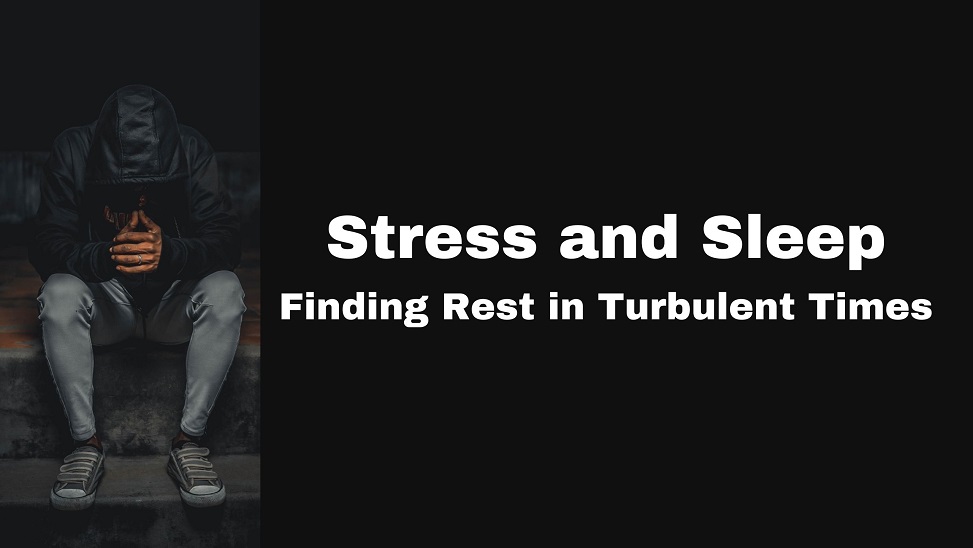Stress and Sleep: Finding Rest in Turbulent Times
Stress and sleep are interconnected aspects of our lives. When stress takes center stage, it can disrupt the delicate balance needed for quality sleep, leading to a cycle of exhaustion and increased stress.
In turbulent times, managing stress and prioritizing sleep is important for maintaining the physical and mental well-being.
This article explores the intricate relationship between stress and sleep, offering practical strategies to find rest and rejuvenation amidst life’s challenges.
The Stress-Sleep Cycle
Stress can have a profound impact on the sleep:
Sleep Disruption: High-stress levels can lead to difficulty falling asleep, staying asleep, or experiencing restful sleep. Racing thoughts, worries, and physical tension can keep you awake at night.
Cortisol Imbalance: Chronic stress triggers the release of cortisol, a hormone that should naturally decrease in the evening. An imbalance can increase alertness at night, making it harder to wind down.
Physical Health Effects: Poor sleep from stress can harm physical health, including weakened immune function, increased risk of chronic diseases & impaired cognitive function.
Strategies to Improve Sleep Amidst Stress
Establish a Sleep Routine
Create a consistent sleep routine by going to bed & waking up at the same time every day, also on weekends. A regular sleep schedule helps to regulate your body’s internal clock and improves sleep quality.
Create a Relaxing Bedtime Ritual
Engage in relaxing activities before bed to signal to your body that it’s time to wind down. This could include reading, taking a warm bath, practicing deep breathing, or gentle stretching.
Limit Screen Time
Electronic devices like mobile and TV emit blue light which can interfere with your body’s production of the sleep hormone melatonin. Avoid screens at least an hour before the bedtime to promote better sleep.
Create a Comfortable Sleep Environment
Ensure your sleep environment is conducive to rest. Make your bedroom cool, dark & quiet. Invest in a comfortable mattress & pillows that support your sleep posture.
Mindfulness and Relaxation Techniques
Practice mindfulness meditation, progressive muscle relaxation, or guided imagery before bed to calm your mind and reduce stress. These techniques can help you transition into a peaceful sleep.
Manage Stress Throughout the Day
Engage in stress-reduction techniques during the day to prevent stress from interfering with your sleep. Regular exercise, deep breathing, and hobbies can help reduce stress levels.
Limit Caffeine and Alcohol
Caffeine & alcohol can disrupt your sleep patterns and exacerbate the impact of stress. Avoid consuming these substances close to bedtime.
Prioritize Nutrition
Eat a balanced diet that supports your physical and mental health. Foods rich in nutrients can positively impact sleep and reduce stress.
Journaling
Write down your thoughts, worries, or tasks before bed to clear your mind and prevent rumination. This can help you feel more organized and at ease when it’s time to sleep.
Seek Professional Help
If sleep problems persist despite your efforts, consider seeking help from a health-care provider or a sleep specialist. They can provide personalized strategies to manage stress and improve sleep quality.
Conclusion
Managing stress and prioritizing sleep is a dynamic process that requires intentional effort. Incorporating these strategies into your daily routine can break the cycle of stress and sleep disruption. Remember that achieving rest in turbulent times involves:
- Creating a sleep-conducive environment.
- Practicing relaxation techniques.
- Nurturing your overall well-being.
By prioritizing sleep, you’re investing in your physical, mental, and emotional health, allowing you to navigate challenges with greater resilience and vitality.
Thanks for visiting How To Cure Stress

